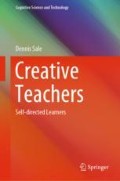Abstract
This chapter addresses the challenge of enhancing student’s intrinsic motivation in school-based learning environments and, in essence, motivation generically. Motivation underpins learning in that without motivation, people don’t bother to learn (or think) too much. It connects extensively to the pedagogic framework developed in Chap. 2, as well as the superordinate twenty-first century competence of Metacognitive Capability explored and illustrated in Chap. 3. Metacognition and Motivation are extensively and dynamically interlinked. Without motivation people are unlikely to do much by way of metacognition. However, without metacognition and the related thinking and self-regulatory skills, people may not fare well in the learning stakes as tasks become more complicated—and that’s an existential problem we face today. Intrinsic motivation is explored in detail, especially the Self-Determination Theory (SDT) of Ryan and Deci, as it offers much potential for enhancing learning and well-being in educational contexts.
Access this chapter
Tax calculation will be finalised at checkout
Purchases are for personal use only
References
Alderman MK (2008) Motivation for achievement: possibilities for teaching and learning. Taylor & Francis Inc., Milton Park, Oxfordshire, UK
Bentham J (1789) Quote. Available at www.goodreads.com/quotes/1013033-nature-has-placed-mankind-under. Last accessed, 3rd Nov 2019.
Brophy J (1987) Synthesis of research on strategies for motivating students to learn. Association for Supervision and Curriculum Development, Alexandria, Virginia
Cloninger CR (1997) A psychobiological model of personality and psychopathology. Jpn Psychosom Med 37:91–102
De Bono E (2019) Quote available at https://www.brainyquote.com/quotes/edward_de_bono_124615. Last accessed on 2nd Dec 2019
Deci EL et al (1991) Motivation and education: the self-determination perspective. Educ Psychol 26(3 & 4):325–346
Dweck CS (2006) Mindset: the new psychology of success. Ballantine, New York
Frankl VE (2014) Man’s search for meaning. Beacon Press, Boston, US
Gallwey TW (1987) The inner game of tennis. Jonathan Cape, London
Gregory G, Kaufeldt M (2015) The motivated brain: improving student attention, engagement, and perseverance. ASCD, Alexandria, Virginia
Harari YN (2016) Homo Deus: a brief history of tomorrow. Vintage, Penguin, London
Harris S (2010) The moral landscape: how science can determine human values. Free Press, New York
Hatano G, Inagaki K (1986) Two courses of expertise. Child development and education in Japan, pp 262–272
Herzberg F (1966) Work and the nature of man. World Pub. Co., Cleveland
Kim SI (2013) Neuroscientific model of motivational process. Front Psychol 4:98. https://doi.org/10.3389/fpsyg.2013.00098
Ladd G, Dinella LM (2009) Continuity and change in early school engagement: predictive of children’s achievement trajectories from first to eighth grade? J Educ Psychol 101(1):190–206
Langer HJ (2016) The power of mindful learning. Da Capo Lifelong Books, Boston, US
Levin B (2008) How to change 5000 schools. Harvard Education Press, Cambridge
Maslow A H (1943) A theory of human motivation. Psychol Rev 50(4):370–396
Maslow A (1962) Toward a psychology of being. Van Nostrand, New York
Miller MD (2016) Minds online: teaching effectively with technology. Harvard University Press, Cambridge, MA
Pink DH (2009) Drive: the surprising truth about what motivates us. Riverhead Books, New York
Pinker S (2003) The blank slate: the modern denial of human nature. Penguin, London
Pinker S (2019) Enlightenment now. Penguin, UK
Reeve J (2015) Giving and summoning autonomy support in hierarchical relationships. Soc Pers Psychol Compass 9(8):406–418
Reeve J et al (2004) Enhancing students’ engagement by increasing teachers’ autonomy support. Motivation Emotion 28(2)
Reeve J, Lee W (2012) Neuroscience and human motivation. In: Ryan RM (ed) Oxford library of psychology. The oxford handbook of human motivation (pp 365–380). Oxford University Press
Reeve J, Tseng C-M (2011) Agency as a fourth aspect of students’ engagement during learning activities. Contemp Educ Psychol 36(4):257–267. https://doi.org/10.1016/j.cedpsych.2011.05.002
Robbins A (2001) Unlimited power. Pocket Books, London
Rutledge P (2012) Social networks: what Maslow Misses. https://www.psychologytoday.com/gb/blog/positively-media/201111/social-networks-what-maslow-misses-0
Ryan RM, Deci EL (2008) Self-determination theory and the role of basic psychological needs in personality and the organization of behaviour. In: The handbook of personality: theory and research. Guilford Press, New York
Ryan RM, Deci EL (2017) Self determination theory: basic needs in motivation, development, and wellness. The Guilford Press, New York
Sale D (2015) Creative teaching: an evidence-based approach. Springer, New York
Saphier J (2017) High expectations teaching. Sage, New York
Schunk DH, Usher EL (2012) Social cognitive theory and motivation. In: Ryan RM (ed) The Oxford handbook of human motivation. Oxford University Press, Oxford, UK
Schunk DH, Zimmerman BJ (2012) Motivation and self-regulated learning: theory, research, and applications. Routledge, New York
Swaab D (2015) We are our brains: from the womb to Alzheimer’s. Penguin, London
Tomlinson CA (2005) The differentiated classroom: responding to the needs of all learners, 2nd edn. ASCD, Alexandria, Virginia
Treadwell M (2017) The future of learning. The Global Curriculum Project, Mount Maunganui, NZ
Vallerand RJ, Pelletier LG, Koestner R (2008) Reflections on self-determination theory. Can Psychol/Psychol Canadienne 49(3):257–262
Wagner T (2010) The global achievement gap. Basic Books, New York
Wlodkowski RJ, Ginsberg MB (2017) Enhancing adult motivation to learn: a comprehensive guide for teaching all adults. Jossey-Bass, San Francisco
Zepke N, Leach L (2010) Improving Student Engagement: ten proposals for action. Act Learn High Educ 11:167
Zig Zigler https://www.brainyquote.com/quotes/zig_ziglar_387369. Last Accessed 30th Nov 2019
Author information
Authors and Affiliations
Corresponding author
Rights and permissions
Copyright information
© 2020 Springer Nature Singapore Pte Ltd.
About this chapter
Cite this chapter
Sale, D. (2020). Motivation and Well-Being: An Evidence-Based Frame. In: Creative Teachers. Cognitive Science and Technology. Springer, Singapore. https://doi.org/10.1007/978-981-15-3469-0_4
Download citation
DOI: https://doi.org/10.1007/978-981-15-3469-0_4
Published:
Publisher Name: Springer, Singapore
Print ISBN: 978-981-15-3468-3
Online ISBN: 978-981-15-3469-0
eBook Packages: Intelligent Technologies and RoboticsIntelligent Technologies and Robotics (R0)

